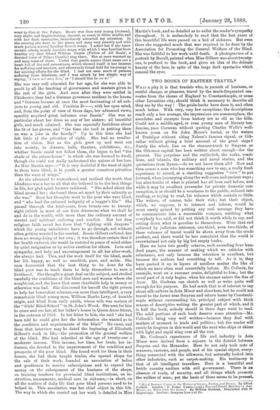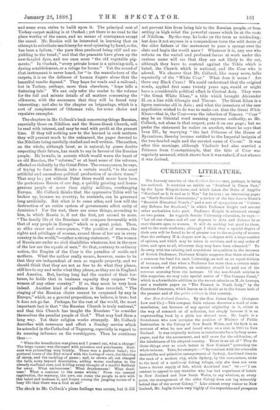TWO BOOKS OF EASTERN TRAVEL.* WHAT a pity it is
that tourists who, in pursuit of business, or restful change, or pleasure, travel by the much-frequented sea- routes from the shores of England to Constantinople, or some other Levantine city, should think it necessary to describe all they see by the way ! The guide-books have done it, and often much better. With very, very few exceptions, the descriptions reach only a low average, the impressions are commonplace, the anecdotes and excerpts from history are as old as the hills. Could not a middle-aged, or even young man of literary ten- dencies, pass Corunna without quoting Charles Wolfe's well- known poem on Sir John Moore's burial, or the waters of Trafalgar without citing Nelson's famous signal, or Gib- raltar without giving a brief account of the great siege ? Surely the whole line on the steamer-track to Smyrna or the Ottoman capital has been written about enough—for the present. The porpoises and the cuttle-fish, the rocks, coast- lines, and islands, the military and naval stories, and the quotations from Byron,—do we not know them all ? Now and then comes a man who has something new to say, a really fresh experience to record, or a startling suggestive " view " to put forward, when journeying along the well-worn and ancient ways ; but nine-tenths of what is printed has all been said before, and while it may be excellent provender for private domestic con- sumption, is or should be a weariness to the public, seduced into reading, or trying to read, fat volumes which contain so little. The writers, of course, take their risk ; but their object, which, we suppose, is to interest and inform, would be more surely gained by putting any real message they have to communicate into a reasonable compass, omitting what everybody has said, or did not think it worth while to say, and setting down what is peculiar to themselves. Were that end achieved by judicious reticence, one-third, even two-thirds, of these volumes of travel would be shorn away from the crude product, and there would be less complaint that the world is overwhelmed not only by big but empty books.
Here we have two goodly octavos, each exceeding four hun- dred pages, the manner of making which we criticise with reluctance, not only because the intention is excellent, but because the authors had something to tell. As it is, they have packed it up in layers of needless matter the like of which we have often read sorrowfully before. Mr. Colbeck, for example, went on a summer cruise, delightful to him ; but the novel part of it only begins when his steamer enters the Sea of Azov. Mr. Cochran can sketch as well as write quite well enough for his purpose. He had much that is of interest to say about silk-culture in Asia Minor and elsewhere, but he could not travel to the farms near Smyrna and return home by Constanti- nople without surrounding his principal subject with thick masses of descriptive writing the greater part of which, and it is half the book, nobody should in these days want to read. The solid portions of each book deserve some attention—Mr. Colbeck's being very well written—because they deal with matters of moment in trade and politics ; but the reader will surely be forgiven in this world and the next who skips or skims with light and rapid wing over all the rest.
Mr. Cochran's experiences of life and industry in Asia Minor were derived from a sojourn in the district between Smyrna and the Menander. Here he not only took note of manners, customs, and people, and of his special object, every- thing connected with the silkworm, but naturally looked into other industries, such as carpet-making. His testimony is that of all intelligent travellers. Here is a beautiful and fertile country smitten with evil government. There is as absence of roads, of security, and all things which promote the welfare of man; yet the basis of these seems to be present,
(1.)A Summer Cruise in the Waters of Greece, Turkey, and Russia. By Alfred Colbeek. London : T. Fisher Unwin.—(2.) Pen-and-Pencil Sketches in Asia Minor; or, Notes front the Levant. By William coohran. Illustrated with 89 Engravings. London Sampson Low and Co.
and some even strive to build upon it. The principal seat of Turkey-carpet making is at Oashak ; yet there is no road to the place worthy of the name, and no means of conveyance except the camel. Mr. Ruskin will be interested in learning that an attempt to substitute machinery for wool-spinning by hand, so far, has been a failure, "the yarn thus produced being stiff and un- yielding to the tread ;" and that the peasants have given up the new-fangled dyes, and use once more "the old vegetable pig- ments." In Oushak, "every private house is a spinning-mill, a dyeing establishment, or a refuge for looms." Yet the sound of that instrument is never heard, for "in the manufacture of the carpets, it is on the deftness of human fingers alone that the beautiful results depend." They hope for roads and a railroad; but in Turkey, perhaps, more than elsewhere, "hope tells a flattering tale." We can only refer the reader to the volume for the fall and minute details of all matters concerning the silkworm, with the assurance that they will be found very interesting; and also to the chapter on brigandage, which is a sort of complement of Ottoman rule, for some choice and repulsive examples.
The chapters in Mr. Colbeck's book concerning things Russian, especially those on Nihilism and the Russo-Greek Church, will be read with interest, and may be read with profit at the present time. If they tell nothing new to the learned in such matters, they will present much to the unlearned, the pages devoted to the Nihilists being carefully studied and well written. The author, on the whole, although beset, as is natural, by grave doubts respecting their future, has much to say in favour of the Russian people. He bewails, in accents which would warm the heart of an old Russian, the "reforms," or at least some of the reforms, effected so violently by the Great Peter. The consequence, he says, of trying to force Russia into a certain mould, "is the most artificial and anomalous political production of modern times." That may be ; yet without Peter there would never have been the portentous Russia of our day, a quickly growing and homo- geneous people of more than eighty millions, overhanging Europe. Mr. Colbeck thinks that the oppressive Tchia will be broken up, because no country, he contends, can be governed long artificially. But what is to come after, and how will the destruction of an entire system of government affect unity of dominion ? For the rest, there are some things, according to him, in which Russia is, if not the first, yet second to none.
"The family life of the Russians will compare favourably with that of any people in Europe," which is a great point. Then, as alike cause and consequence, "the position of woman, the rights and privileges of woman, exceed those of her sex in every country in the world,"—rather a strong statement. "The women of Russia are under no civil disabilities whatever, but in the eyes of the law are the equals of men." So that, contrary to ordinary notion, the Empire of the Czar is the paradise of maids and mothers. What the author really means, however, seems to be that they are independent of men as regards property, and we should think that they are not as free to do what they please, still less to say and write what they please, as they are in England and America. But, having long had the control of their for- tunes, he holds that in business capacity they surpass "the women of any other country." If so, they must be very keen indeed. Another kind of excellence is thus recorded, "The singing of the Russian choirs cannot be surpassed by any in Europe," which, as a general proposition, we believe, is true ; but it does not go far. Perhaps, for the rest of the world, the most important fact is that "the Russian Church is truly national," and that this Church has taught the Russians "to consider themselves the peculiar people of God." That may lead them a long way. Yet their religion works strangely. Mr. Colbeck describes with reverence and effect a Sunday service which he actended in the Cathedral of Taganrog, especially in regard to its seeming influence on the worshippers. Then he continues thus :—
"When the benediction was given and I passed out, what a change! The large square was thronged with salesmen and purchasers. Busi- ness was proceeding very briskly. There was a perfect babel ; the guttural tones of the Slav mixed with the lowing of oxen, the bleating cf sheep, and the cackling of geese ; and, to crown all, out clanged the bells, noisy beyond description, adding worse confusion to the already confused ears, and driving every thought of a restful Sabbath far away. What uncleanness ! What drunkenness ! What dead- ness! What a contrast to the scene within ! From the sensual captivation, the mystery, the awe, out came the people to mix with this babel and increase it, and forget among the jangling noises of a busy life that there was a God at ail."
The shock to Mr. Colbeck's pions feelings was severe, but it did
not prevent him from being fair to the Russian people, or from setting in high relief the powerful causes which lie at the roots of Nihilism. By-the-way, he looks on the term as misleading; but does it not express in a compendious form the wild desire of the elder fathers of the movement to pass a sponge over the slate and begin the world anew ? Whatever it is, any one who reflects on the varied and profound forces at work under this curious name will see that they are not likely to die out, although they have to contend against the Tchin which is hated, the Church which is national, and the Czar who is adored. We observe that Mr. Colbeck, like many more, talks repeatedly of the "White Czar." What does it mean ? Are there any Black Czars ? We could understand that the original words, applied first some twenty years ago, would or might have a considerable political effect in Central Asia. They were "the Great White Khan," a title which brought Alexander II. on a line with Ghengis and Timonr. The Great Khan is a figure centuries old in Asia ; and what the inventors of the new appellation wished to do was to make out that the Great While Khan—that is, the Czar—was the inheritor of Timour. " Czar " may be an Oriental word meaning supreme authority, as Mr. Colbeck, not alone in that respect, puts it on one page ; but we prefer the statement he makes on another, where he says that Ivan III., by marrying "the last Princess of the House of Byzantium, thereby became entitled to the Imperial insignia of the two-headed eagle and the coveted name of Cmsar." It was after this marriage, although Vladimir had also married a Princess from Constantinople, that the title of Czar was regularly assumed, which shows how it was valued, if not whence it was derived.



















































 Previous page
Previous page